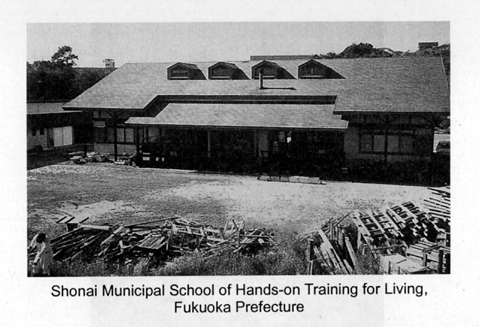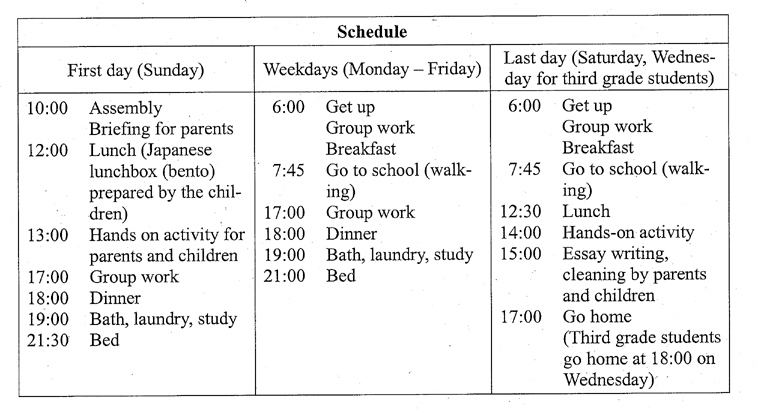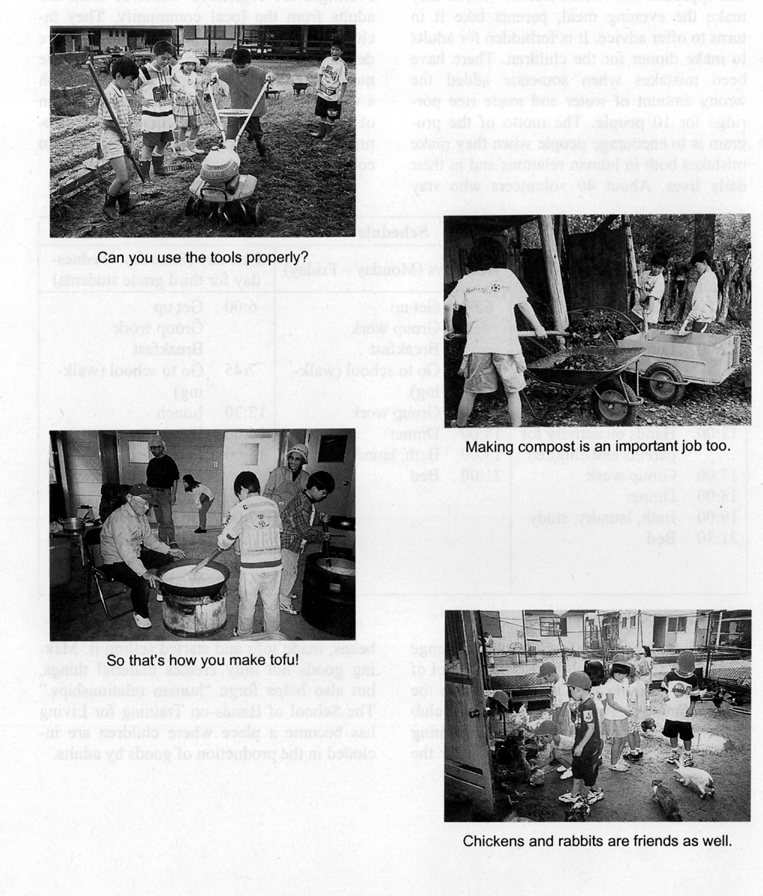| Home > Policy > White Paper, Notice, Announcement > White Paper > Japanese Government Policies in Education, Science, Sports and Culture1999 > Part2 Q10 | ||
A:You need to be careful not make an elementary school age child attend a juku to excess.
It is important for children to study for a certain goal.Even so,it is not good for them to be be-hind a desk studying all day.Life is long,so it is better to have a variety of experiences in child-hood in order to prepare for the future.Child-hood is a time when we should build strong foundations rather than force the completion of narrow building based on knowledge.If the foundations are strong,the building will be sta-ble in the future and will survive earthquakes.It makes the home a gloomy place that children spend all day studying and that parents and chil-dren alternate between happiness and despair depending on exam results.It is important to consider whether it is a good thing to send your child to a juku in light of the resultant sacrifice of family interaction and domestic harmony.Elementary school children are still developing emotionally and physically,so if they continu-ally lose sleep from attending a juku until late at night,it can disrupt their physical and emotional balance and have a negative influence on healthy growth and development.It is not necessary to be unnaturally extended in the early teens.On the other hand,it is important for children to have a variety of experiences with friends and neighbors and to have outdoor activities.It is also important for them to help with housework.As contained in the Lifelong Learning Council report of June1999,entitled"Experience of Nature and Life Cultivates the Emotional Development of Japanese Children,"a Ministry of Education,Science,Sports and Culture(MESSC)nation-wide survey of around11,000elementary and lower secondary school students in FY1998 found that children with more experience of daily-life and outdoor activities and children who help with housework tend to have a stron-ger sense of morals and justice.Rather than studying all day from childhood and becoming a narrow intellectual adult,it is better to become an adult with a wealth of individuality and filled with humanity.In future,it will become more important to think about what to study rather than what university to attend.Companies are already beginning to require people with human qualities,fresh ideas and the ability to make decisions,rather than focus on academic credentials.If society,which is preoccupied with academic credentials,changes in this way,the attitude towards study-ing for exams from elementary school will change by itself.We often hear talk of children being able to un-derstand their lessons at school or becoming interested in studying due to the good instruction received at a juku.There are also a growing number of juku that are adopting programs to include experience of outdoor activities and social activities.However even in these cases when children spend too long attending juku or stay there until late at night,it is not beneficial for healthy emotional and physical development.For children,it is most important to create a happy family with a warm environment.
In Shonai-cho,Fukuoka Prefecture,there is a municipal dormitory for children called the School of Hands-on Training for Living.Since1989it has held a full-scale school boarding program20times annually.Those eligible to participate are volunteers from the third to fifth grade of the Shonai Elementary School,the only school in town.For each program,a group of10students is organized.The children stay at the facility for one week from Sunday to Saturday cooking for them-selves while attending school.There are no adults at the facility to make meals for the children.They not only prepare their own meals,but also heat the baths with firewood.They also do laundry,cleaning and make their own beds.At the School of Hands-on Training for Living,they keep horses,dogs,cats,chickens,rabbits,ducks and birds.The children's work includes cleaning up the dog excrement and horse manure each morning,feeding all the animals and collecting the chicken's eggs.In addition,they compost daily organic waste,horse manure and weeds from the fields.Since the establishment of the School of Hands-on Training for Living,it has made compost without producing any organic waste for dis-posal.Sometimes,the children also remove night soil from a toilet and pour it on the compost.The addition of human waste to the compost promotes fermentation.They also spread the mature compost on the fields and grow vegetables.The children produce about70-80%of the vegetables they eat in the week.Every year in autumn,they raise about2000acorn seedlings.After two years,the acorn seedlings are transplanted to the em-bankments surrounding the industrial estate to create an acorn forest. Shonai Municipal School of Hands-on Training for Living,Fukuoka Prefecture
 By the time they graduate from Shonai Ele-mentary School,about60%of the children have experienced the school boarding pro-gram.Third-grade students stay three nights and four days,and fifth and sixth grade stu-dents stay six nights and seven days.At the boarding school,the children deepen and broaden tbeir relationships with each other and with adults through the program of ac-tivities shown below.The daily schedule is long,and the children can not live without cooperating with one another.They experi-ence cooperation in terms of how to behave in daily situatjons.Sometimes there is oppo-sition and hostility as well as cooperation.At the School of Hands-on Training for Living,there is no end of school time,so thorough discussions that take up a lot of time are pos-sible.When there are complications in human relationships related to school life,children can approach the school teacher.When they make the evening meal,parents take it in turns to offer advice.It is forbidden for adults to make dinner for the children.There have been mistakes when someone added the wrong amount of water and made rice por-ridge for10people.The motto of the pro-gram is to encourage people when they make mistakes both in human relations and in their daily lives.About40volunteers who stay overnight are registered.Most of them are adults from the local community.They in-clude kind people and people who are more demanding than anyone the children have met before.They experience interaction with a variety of people.The common impression of the children who participate is:"Some-times it was hard,but I enjoyed it.I want to come agan."  In April1998,the Life Cultural Exchange Center for adults,which is also the School of Hands-on Training for Living,opened in the same complex.An elderly people's club made1OOkg of pickled plums and a farming family that grows soy beans brought the beans,made tofu and started selling it.Mak-ing goods not only creates material things,but also helps forge"human relationships."The School of Hands-on Training for Living has become a place where children are in-cluded in the production of goods by adults.  |
| Back to Top | MEXT HOME |